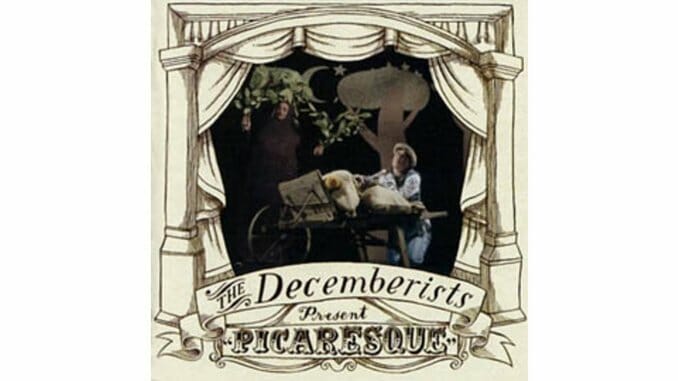
Picaresque is the consummate Decemberists album title: It means “pertaining to rogues or rascals,” a propensity of Colin Meloy’s loquacious, theatrical pop narratives (see the nine-minute klezmer epic “The Mariner’s Revenge Song” for a sterling example). More specifically, it refers to a fiction of Spanish origin with a rakish anti-hero as its protagonist. It also sums up Meloy’s favorite songwriting devices—arcane language, idiosyncratic narrative fiction, archetypal characters, and the exotic whiff of foreign lands and bygone eras—in one deft musical stroke.
The Decemberists’ first two records—Castaways and Cutouts and Her Majesty (both in 2003)—felt a touch spotty. The same mania for colorful fictive detail that made them unique inadvertently skewed toward the overly precious. At times you could imagine a certain lyric being used not because it suited the song, but simply because it rhymed with “joie de vivre.” Picaresque trumps them both by dint of its focus, consistency and restraint. Meloy’s melodies no longer meander; they unspool in taut lines, and his lyrical borders are more tightly cropped than ever before. “We Both Go Down Together” subtly echoes R.E.M.’s “The One I Love,” memorializing the suicide of two lovers separated by a class divide in suitably grand, bittersweet tones. One infinitely hummable tune, “The Engine Driver” cycles its perspective between various emotionally captive narrators, while Meloy’s most winsome melodic phrasing graces “At the Bus Mall,” a tale of runaway prostitutes.
Meloy’s songs once depicted an international history of stevedores and legionnaires without much rhyme or reason, but on Picaresque he zeroes in on characters—usually those struggling in the throes of concealed, unrequited or otherwise ill-fated love—before shifting his focus to setting. “The Infanta,” all galloping guitars and pounding drums, contrasts the ornate coronation of a Portuguese princess with the placid simplicity of her dreams. The quiet lament “Eli, the Barrow Boy” relates the tale of a heartbroken ghost—Sisyphus in corduroy pushing his barrow in eternal penance. Meloy even ventures into an American present as outlandish as his imagined past. “The Sporting Life”—which interleaves a swinging, jaunty beat with swelling organ flourishes—relates the humiliation of an injured soccer player who fails to fulfill his father’s athletic aspirations, and the shimmering, upbeat stomp of “Sixteen Military Wives” conflates the American invasion of Iraq with the Academy Awards ceremony in what is—for the antiquarian Decemberists—an unusually timely statement.
Meloy’s appropriation of antique yarns shares some aesthetic space with oft-cited influence Neutral Milk Hotel, but his affinity with the reedy yowl and meticulously sculpted songs of John Vanderslice is more striking. Vanderslice claims fiction writer Steven Millhauser as a guiding influence for his concept records about child prodigies and other gifted pariahs. And Millhauser’s predilection for quaint characters and highly specific period pieces—as well as his knack for locating the seam where sweetness and darkness dovetail—resonates through The Decemberists’ songs even more than Vanderslice’s.
As The Decemberists hone their musical prose, they’re upping the bar for “literate” songcraft: It’s no longer sufficient to leaf through Kafka in the aisle at Barnes & Noble; to keep apace with Meloy, you can start by enrolling in a post-graduate lit course. At an Ivy League university of your choice.